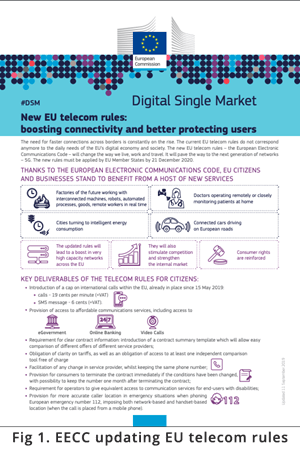On February 4, 2021 the EC began infringement procedures against 24 EU member states that had failed to transpose the EECC into national legislation by the December 21, 2020 deadline. Only Greece, Hungary, and Finland had notified the EC that they had adopted all necessary measures for transposing the EECC, as had the UK, which had to transpose the code by the deadline as a legal requirement of the EU-UK Withdrawal Agreement.
The EC has sent formal notification to the remaining 24 EU member states requesting them to adopt the relevant measures, and the countries have two months to reply. In December 2018 the scope of the EECC, which is the regulatory framework governing the EU telecoms sector, was broadened to include all interpersonal communications services, including over-the-top (OTT) services, in an effort to bring it up to date with sectoral developments. The definition of electronic communications service expanded to include three subcategories of services:
- Internet access services
- Conveyance of signals
- Interpersonal communications
It is unlikely that the EC will punish member states for not meeting the EECC deadline because of the pandemic
However, the full level of regulation only applies to phone-number-based services and not to number-independent ones. Under the new framework, many OTT communications services still only become subject to a limited set of new requirements, while others (specifically, those that allow a breakout to the public switched telephone network [PSTN]) are regulated on the same level as traditional telecoms services.
For the first time, internet-based services may need to register their offerings in many of the EU countries in which they operate. Among these newly regulated services are email, connected wearable devices, and an array of other OTT applications such as audio, video, and other streaming media content delivered over the internet. Under the new arrangements, end users will be protected irrespective of whether they communicate through traditional methods such as calls or SMS or through web-based services such as Skype or WhatsApp.
The new code came into force in December 2018, and member states had two years to transpose the rules into national law. The new code was expected to harmonize the existing legal framework for electronic communications across the EU to encourage better connectivity and improve consumer protection (the first page 1 is shown in Fig. 1 - click to download the full PDF), but with such limited compliance across the region, more work will need to be done before harmonization occurs. Most of the remaining member states are in the process of implementing the code; for example, France, Germany, Sweden, Romania, and Slovenia expect to implement the legislation by 2H21. For many member states the extraordinary circumstances caused by COVID-19 restrictions have led to some delays, but it is likely that many will catch up and enact the code during 2021. The EC has not indicated whether it will punish member states for not adhering to the deadline, but it is unlikely that the member states will face a fine, thanks to the exceptional circumstances of the COVID-19 pandemic. Instead, the EC is likely to try to work amicably with member states to find a timeframe for adoption, probably by the end of 2021.




